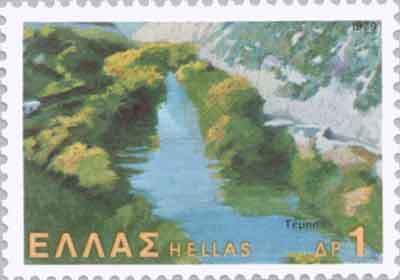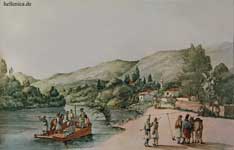 Vale of Tempe, Satellite image
Vale of Tempe (modern Greek: Témbi) the ancient name of a narrow valley in North Thessaly, Greece, through which the Pineios River reaches the Aegean sea. The cliffs reach 1,650 feet (500 meters), and is as narrow as 25 metres in other places, it is about 10 kilometers long. It is between Olympus on the north and Ossa on the south. It is celebrated by the Greek poets as a favourite haunt of Apollo and the Muses. The Tempe pass is a strategic pass in Greece since it is where the main north-south road passed. It can be sidestepped from the Sarantoporo straight at a cost of time. Due to its strategic position it has been a battlefield throughout history. In 480 BC 10,000 Athenians and Spartans tried to stop Xerxes's invasion, but where sidestepped through Sarantoporo. During the Third Macedonian War in 164 BC the Romans broke through Perseas's defence's and later defeated him in the battle of Pydna. During the revolution of Andriskos in 148 BC the valley was the site of another conflict. There were other battles fought there during the barbarian raids that mark the end of the Roman era in Greece and in Byzantine and Ottoman times.
Murrays Handbook of Travels 1854: Ford says, in his " Lover's Melancholy " " Passing from Italy to Greece, the tales Among the many ancient writers who have described this famous pass, the most accurate descriptions are those of Livy (xliv. 6), and of Catullus (Epithal. Pel. et Thet.). Tempe is a narrow rocky defile, 5 miles long, in which there is often only room for the traveller and the Peneus to travel side by side. It is a cleft or chasm, as its name implies . The banks are fringed with the low lentisk, the pliant agnus castus, and the sacred bay from which Apollo culled the shoot which he transplanted to the borders of the Castalian rill. Pompey, after his defeat at Pharsalla, rode rapidly to Tempe, a 40 miles' ride, where he quenched his burning thirst in the waters of the Peneus. He never drank again of the rivers of Greece.
Retrieved from "http://en.wikipedia.org"
 |
|
||||||||||||||||||








